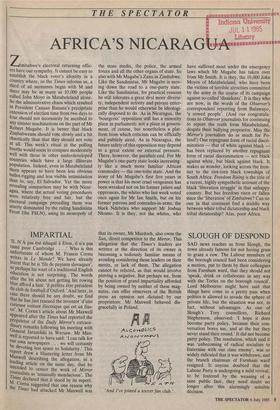IMPARTIAL
'IL N'A pas ete eduque a Eton, il n'a pas raine pour Cambridge . . . .' Who is this unfortunate of whom M. Francis Cornu writes in Le Monde? We have already learnt that he is 'fits de paysans slovaques', SO perhaps his want of a traditional English education is not surprising. The words after the bit about not getting his rowing blue afford a hint: prefere etre president du club de football d'Oxford.' And later, in case there should be any doubt, we find that he has just rescued the inventor 'd'une curieuse voiture electrique qui est un fias- co'. M. Cornu's article about Mr Maxwell appeared after the Times had reported the Proprietor of the Daily Mirror's extraor- dinary remarks following his meeting with General Jaruzelski in Warsaw. Mr Max- well is reported to have said: 'I can talk for our own newspapers . . . we will certainly be devoting less space to Solidarity.' This report drew a blustering letter from Mr Maxwell describing the allegation, in a leading article on the same day, that he intended to censor the work of Mirror Journalists as 'unusually mendacious'. The Times declared that it stood by its report. M. Comu suggested that one reason why the Times had attacked Mr Maxwell was
that its owner, Mr Murdoch, also owns the Sun, direct competitor to the Mirror. This allegation that the Times's leaders are written at the direction of its owner is becoming a tediously familiar means of avoiding considering those leaders on their merits, or lack of them. The allegation cannot be refuted, as that would involve proving a negative. But perhaps we, from the position of grand impartiality afforded by being owned by neither of these mag- nates, can offer observers of the British press an opinion not dictated by our proprietors: Mr Maxwell behaved dis- gracefully in Poland.
'And I've joined a soccer fan club.'


















































 Previous page
Previous page